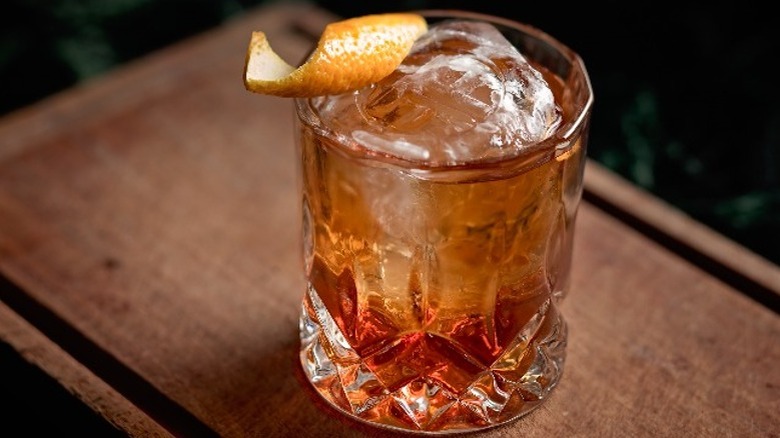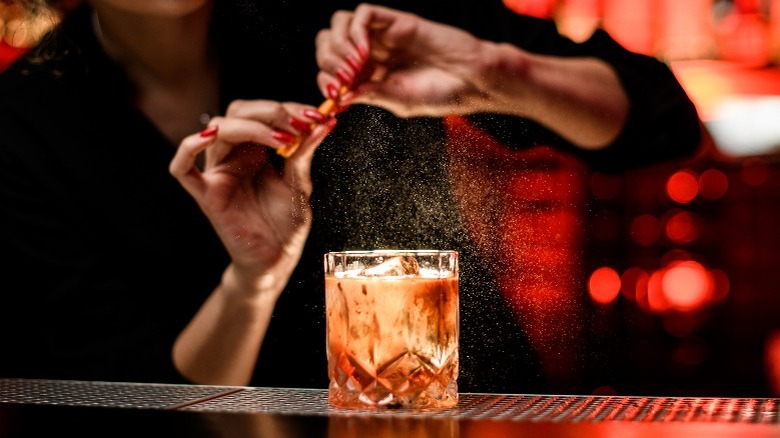Alton Brown's Go-To Cocktail Order Is A Test For Bartenders
Alton Brown, renowned culinary expert and TV personality, agrees that likely only 12% of Manhattan's bartenders have mastered the art of a classic old fashioned. So, he has a penchant for ordering the timeless cocktail when he walks into a bar, not only as a personal preference but also as a strategic move to gauge a bartender's expertise. With the art of mixology seemingly in constant upswing, creativity tends to take precedence over the skills it takes to consistently craft a well-balanced classic cocktail.
According to William Grimes' book "Straight Up or On the Rocks: The Story of the American Cocktail," the old fashioned dates back to the 19th century and should continue to hold a special place in the modern world of mixology. Its simplicity and reliance on quality ingredients can truly showcase a bartender's craftsmanship. Alton Brown's preference for this classic is rooted in its historical significance and a desire to witness expertise that has stood the test of time. Here's why the old fashioned is the ultimate litmus test of an order when it comes to the proficiency and attention to detail you hope to experience at a potential favorite bar.
The mastery of the old fashioned
Made with just a few ingredients — whiskey, sugar, bitters, and a twist of citrus — the old fashioned may seem like a straightforward drink, but its true mastery lies in the subtle intricacies of its preparation. When ordering an old fashioned, one can gauge a bartender's skill in several key areas. Firstly, according to Gary Regan's "The Joy of Mixology," the muddling technique is crucial. The sugar and bitters need to be gently and precisely muddled to release their flavors without overpowering the drink. This delicate balance showcases a bartender's ability to control the process and extract the desired essence.
Secondly, the choice of whiskey plays a significant role. A skilled bartender will understand the nuances of different whiskey varieties and select one that complements the other ingredients, enhancing the overall flavor profile of the cocktail.
Lastly, the bartender's attention to detail during the preparation of the drink is a pillar of what mixology should be. From the careful selection of large, crystal-clear ice cubes to the meticulous garnishing and presentation, every aspect of the drink should be executed with precision. And while the old fashioned itself is a classic and involves precision, a talented bartender can showcase their adaptability and attentiveness to the customer's taste by making subtle cocktail ingredient adjustments based on careful conversation as well as instinct.
Why the old fashioned?
A bartender who excels at crafting this enduringly popular cocktail demonstrates a respect for the foundations of mixology and a dedication to mastering the fundamentals. As is spelled out in Albert W. A. Schmid's book "The Old Fashioned: An Essential Guide to the Original Whiskey Cocktail," it's a drink that serves as a benchmark for a bartender's competence, transcending passing trends and fads. It demands a meticulous approach, an understanding of balance, and a commitment to preserving the integrity of the drink's heritage.
Alton Brown acknowledges that there is an abundance of talented bartenders, but finds a distinction between bartenders and self-proclaimed "mixologists." While the term mixologist implies a deep knowledge of complex recipes and modern techniques, the mastery of classic cocktails like the old fashioned is the true measure of a bartender's skill.
By ordering an old fashioned, you can uncover the subtleties that differentiate a standard bartender from an extraordinary one. From the proper muddling technique to a nuanced understanding of flavor balance and a customer's palate, a bartender's expertise can truly shine through this seemingly simple cocktail.



